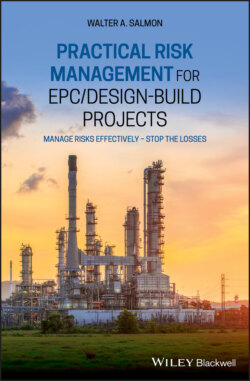Читать книгу Practical Risk Management for EPC / Design-Build Projects - Walter A. Salmon - Страница 29
2.8 Selecting the EPC Contractor
ОглавлениеIn an effort to select the best Contractor for an EPC Project, the Employer will normally issue a suite of appropriate bidding (tender) documents to a group of prequalified construction-focused bidders that are highly experienced in, and can demonstrate satisfactory execution of, EPC work. Those bidding documents set out the specific requirements of the Employer for the work to be performed, as well as the requirements for the end outputs from the completed facility. The bidding process itself is frequently divided into two distinctly separate parts (the Technical Bid Proposal and the Commercial Bid Proposal), where the Employer will not proceed with considering a Commercial Bid Proposal until the corresponding Technical Bid Proposal has been found to be acceptable.
The Contractor's preparation work for its Bid Proposals will usually be undertaken under the direction and control of its Proposal Department, and it will also involve a range of different people from the company's corporate workforce (i.e. personnel who are part of the main office's permanent staff and who will not usually be allocated to work on any specific Projects). A tremendous amount of work goes into preparing both the Technical and the Commercial Bid Proposals, and it is not unusual for the EPC Contractor procurement process, from floating of the bid enquiry by the Employer to signing of the Contract, to take more than a year to complete.
The Technical Bid Proposal is compiled with input from the Contractor's technical teams, after which it is subjected to evaluation by the Employer. The main purposes of such an evaluation are:
1 to establish the Contractor's capability for executing the Project, and
2 to determine if the Technical Bid Proposal meets the Employer's requirements fully and can therefore be considered acceptable.
If the Technical Bid Proposal is found to be acceptable, the bidder will then be requested to submit the Commercial Bid Proposal. In the case of the lump-sum portion of the bid, its components will comprise priced line items for the various elements encompassed within the specified work scope. In addition, there will most probably be a requirement for the Contractor to price a schedule of rates that the Employer has provided, which would then be used later to assess the value of potential Variations. Owing to the high level of competition nowadays for new overseas construction Projects, the average industry profitability level priced in for EPC Projects is not very high (ranging from 2.5% to 7.5% on net costs, depending on the perceived level of risks involved). However, in one particular study conducted by Galonske and Weidner in a seemingly good earnings window for the plant construction industry, the actual ratio of Earnings before Interest and Taxes (EBIT) to Net Revenue earned was found to vary from +6% down to −4%.12 This demonstrates just how tough it is for Contractors to make a profit on EPC Projects.
Moving forward, once the Employer has accepted a bidder's Technical and Commercial Bid Proposals, the Employer will generally issue a Letter of Intent to the selected Contractor before the formal Contract is signed, in order to save time in commencing the Project's implementation work. However, before the Employer issues such Letter of Intent, many negotiations and discussions will have taken place regarding the wording of the contractual and work scope clauses. In fact, a lot of effort and resources are put into that exercise, right from the stage of compiling the Bid Proposals through to the receipt of the Letter of Intent. Those costs, along with all other costs of bidding, are solely borne by each bidder at its own expense, and they are generally recorded (written off) in the financial statements of the bidders as management expenses.
It is usual for all the bidding work to be conducted in the main offices of the bidders in their home countries, even where a bidder is already working in the country where the Project is to be built. Primarily this is because it is much cheaper to do so, but also because it is easier to control the bidding activities than it is if they are conducted remotely from the main office. Even so, the bidding costs for the average Contractor are large, take up a lot of people over a long duration (as I mentioned earlier, 12 months is not unusual). Sadly though, for the typical Contractor, the bidding success rate is low; only about one in five or so bids will result in a Contract award (unless, it seems, it is a Korean company).13
